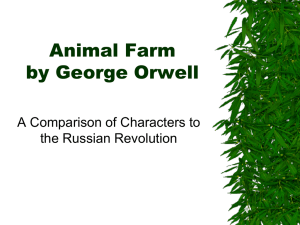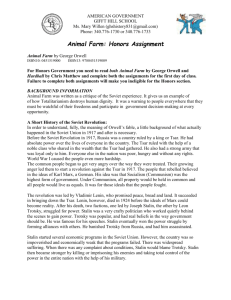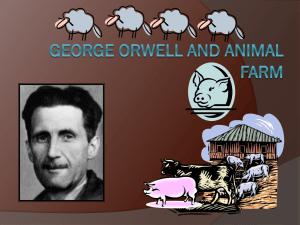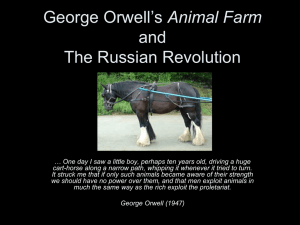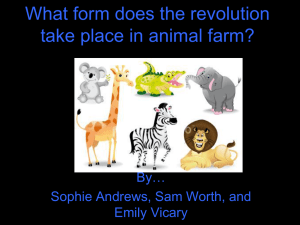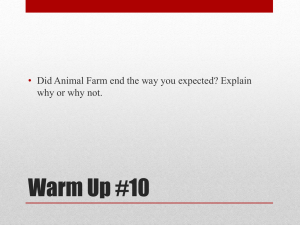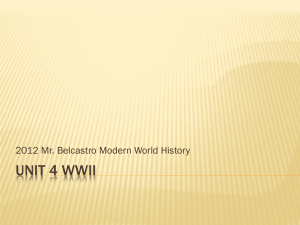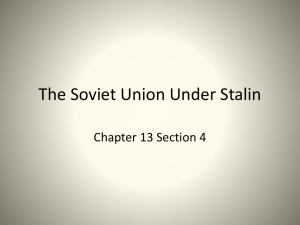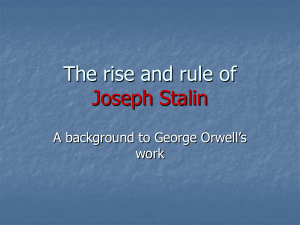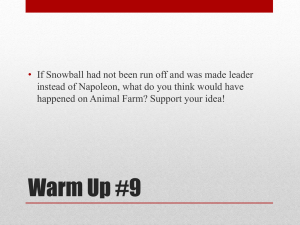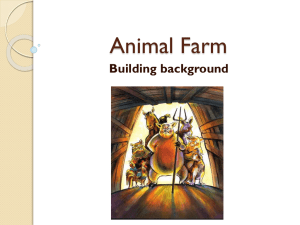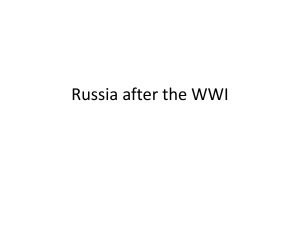Animal Farm
advertisement
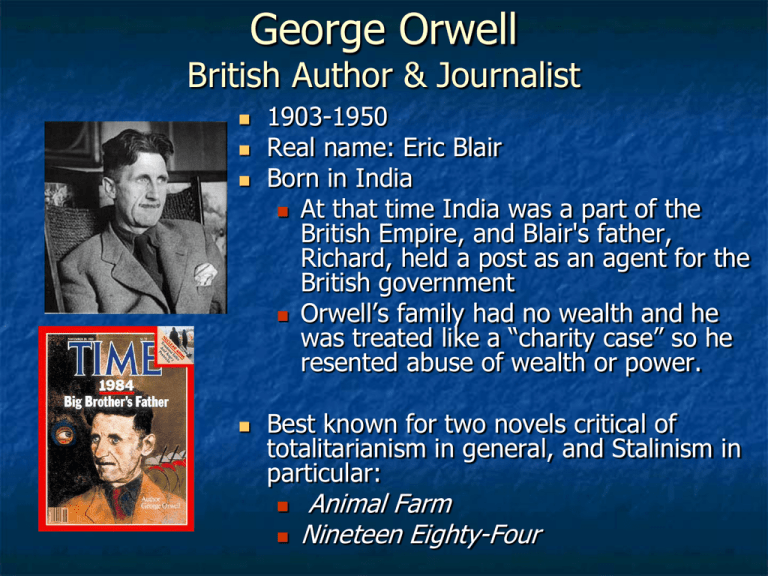
George Orwell British Author & Journalist 1903-1950 Real name: Eric Blair Born in India At that time India was a part of the British Empire, and Blair's father, Richard, held a post as an agent for the British government Orwell’s family had no wealth and he was treated like a “charity case” so he resented abuse of wealth or power. Best known for two novels critical of totalitarianism in general, and Stalinism in particular: Animal Farm Nineteen Eighty-Four George Orwell and His Beliefs Orwell’s beliefs about politics were affected by his experiences fighting in the Spanish Civil War of 1937. He saw what Russia’s revolutionaries were doing to spread Communism (it wasn’t pretty). Orwell loved Democratic Socialism but despised the actions of the Russian Communists. He hated how Europe and America romanticized the Russian revolution. “It taught me how easily totalitarian propaganda can control the opinion of enlightened people in democratic countries.” He was skeptical of governments and their willingness to forsake ideas & individual rights in favor of power. “Since 1930 I had seen little evidence that the USSR was progressing toward anything that one could truly call socialism.” According to Orwell, the USSR was a “hierarchal society, in which the rulers have no more reason to give up their power than any other ruling class.” The Anti-Soviet Book and the Hardships of Publication The United Kingdom was still enamored with the USSR and considered them “politically decent” in 1943 (when Animal Farm was completed). Stalin seemed like a nice guy until world leaders properly met him. Not until two years later would a publisher be willing to publish Orwell’s book because no one wanted to print an Anti-Soviet story. Why Animals? In explaining how he came to write Animal Farm, Orwell says he once saw a little boy whipping a horse and later he wrote: “It struck me that if only such animals became aware of their strength we should have no power over them, and that men exploit animals in much the same way as the rich exploit the [worker].” What is Animal Farm? A masterpiece of political satire, Animal Farm is a tale of oppressed individuals who long for freedom but don’t realize that when they are told they are “free” they really aren’t. The story follows mistreated farm animals. After extreme negligence by their owner, the animals revolt and expel Mr. Jones and his wife from the farm. The tale of the society the animals form into a totalitarian regime is Orwell's critique of the communist system in the former Soviet Union. An FYI: Soviet Union = USSR = Russia Children’s Book? – No! After Animal Farm was published in 1945, George Orwell discovered with horror that booksellers were placing his novel on children’s shelves. According to his housekeeper, he began traveling from bookstore to bookstore requesting that the book be shelved with adult works. This dual identity — as children’s story and adult satire — has stayed with Orwell’s novel for more than fifty years. The Fable The fable is one of the oldest literary forms - much, much older than the novel or the short story. A fable is usually short, written in either verse or prose, and conveys a clear moral or message. The earliest fables still preserved date back to 6th Century Greece B.C.E. The author of these fables, Aesop, used animal characters to stand for human "types." For example, a lion character might embody the human characteristics of pride and leadership. Though Aesop's animal fables were ostensibly about animals, they were really instructional tales about human emotions and human behavior. Allegory Most fables have two levels of meaning. On the surface, the fable is about animals. But on a second level, the animals stand for types of people or ideas. The way the animals interact and the way the plot unfolds says something about the nature of people or the value of ideas. Any type of fiction that has multiple levels of meaning in this way is called an allegory. Animal Farm is an ALLEGORY of Stalinist Russia. = Allegory (cont’d) Boxer Animal Farm is strongly allegorical, but it presents a very nice balance between levels of meaning. On the first level, the story about the animals is very moving. But at the same time, each of the animals does serve as a symbol. The story's second level involves the careful critique Orwell constructed to comment on Soviet Russia. Allegory (cont’d) Yet there is no reason that allegory must be limited to two levels. It is possible to argue that Animal Farm also has a third and more general level of meaning. For instance, the pigs need not only represent specific tyrannical Soviet leaders. They could also be symbols for tyranny more broadly: their qualities are therefore not simply the historical characteristics of a set of actual men but are the qualities of all leaders who rely on repression and manipulation. Squealer, Snowball, & Napoleon Satire In a satire, the writer attacks a serious issue (a human weakness or injustice) by presenting it in a ridiculous light or otherwise poking fun at it. Orwell uses satire to expose what he saw as the myth of Soviet Socialism. Soviet Coat of Arms Animal Farm is a SATIRE because it ridicules: abuse of power, weakness caused by ignorance, & unequal “equality”. What are some examples of satirical titles, old or new? Gulliver’s Travels Oliver Twist Lord of the Flies Nineteen Eighty-Four The Onion American Psycho The Daily Show The Colbert Report Hitchhiker's Guide to the Galaxy Lysistrata Huckleberry Finn The Boondocks South Park Dr. Seuss The Russian Revolution Animal Farm is an allegory of the Russian Revolution. In the early 1900s, Russia’s Czar Nicholas II faced an increasingly discontented populace. By 1917, after decades of suffering amongst the lower classes, a revolution began. the Czar’s government was overthrown and replaced by the Czar Nicholas II Bolshevik leadership of Vladimir Lenin. When Lenin died in 1924, his former colleagues Leon Trotsky, hero of the early Revolution, and Joseph Stalin, head of the Communist Party, struggled for power. Stalin won the battle, and he deported Trotsky into permanent exile. Joseph Stalin Vladimir Lenin Leon Trotsky Characters Old Major An old boar whose speech about the evils perpetrated by humans rouses the animals into rebelling. Dies before revolution Karl Marx (and Vladimir Lenin) The inventor of communism, preaches equality of all people Dies before the Russian Revolution Joseph Stalin Once in power, Stalin began, with despotic urgency and exalted nationalism, to move the Soviet Union into the modern industrial age. His government seized land in order to create collective farms. Stalin’s Five Year Plan was an attempt to modernize Soviet industry. Many peasants refused to give up their land, so to counter resistance Stalin used vicious military tactics. Rigged trials led to executions of an estimated 20 million government officials and ordinary citizens. The government controlled the flow and content of information to the people, and all but outlawed churches. Joseph Stalin Napoleon = Joseph Stalin Napoleon Boar who leads the rebellion against Farmer Jones After the rebellion’s success, he systematically begins to control all aspects of the farm until he is an undisputed tyrant. Joseph Stain The communist dictator of the Soviet Union from 1922-1953 who killed all who opposed him. He loved power and used the KGB (secret police) to enforce his ruthless, corrupt antics. Farmer Jones = Czar Nicholas II Farmer Jones The irresponsible owner of the farm Lets his animals starve and beats them with a whip Sometimes shows random kindness Czar Nicholas II Weak Russian leader during the early 1900s Often cruel and brutal to his subjects Displays isolated kindess Animal Farm Revolution = Russian Revolution Animal Farm Revolution Was supposed to make life better for all, but . . . Life was worse at the end. The leaders became the same as, or worse than the other farmers (humans) they rebelled against. Russian Revolution Was supposed to fix the problems created by the Czar, but . . . Life was even worse after the revolution. Stalin made the Czar look like a nice guy. Snowball = Leon Trotsky Snowball Boar who becomes one of the rebellion’s most valuable leaders. After drawing complicated plans for the construction of a windmill, he is chased off of the farm forever by Napoleon’s dogs and thereafter used as a scapegoat for the animals’ troubles. Leon Trotsky A pure communist leader who was influenced by the teachings of Karl Marx. He wanted to improve life for people in Russia, but was driven away by Stalin’s KGB. Squealer & Boxer Squealer A big mouth pig who becomes Napoleon’s mouthpiece. Throughout the novel, he displays his ability to manipulate the animals’ thoughts through the use of hollow, yet convincing rhetoric. Represents the propaganda department that worked to support Stalin’s image; the members of the department would use lies to convince the people to follow Stalin. Squealer Boxer A dedicated but dimwitted horse who aids in the building of the windmill but is never rewarded. Represents the dedicated, but tricked communist supporters of Stalin. Many stayed loyal even after it was obvious Stalin was a tyrant. Eventually they were betrayed, ignored, and even killed by him. Boxer Mollie = Middle-class (bourgeoisie) or White Russians Mollie Carriage horse with an easy life Missed comforts under Mr. Jones Leaves Animal Farm to live with humans White Russians Lived comfortably under Czar Nicholas II Opposed the Bolshevik Revolution Fought the “Reds” & lost Fled to Europe Moses = Organized Religion Moses Crow that serves under Jones Lies to animals about Sugarcandy Mountain Leaves for a while but returns to the farm to serve Napoleon Orthodox Catholic Church Empowered by Nicholas II and very wealthy Removed from USSR by the Bolsheviks Stalin reinstated religion to give his dying people something to motivate them
